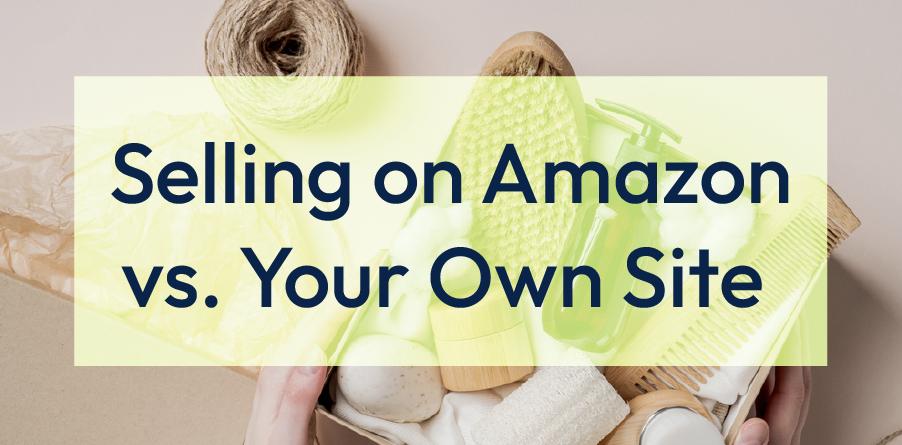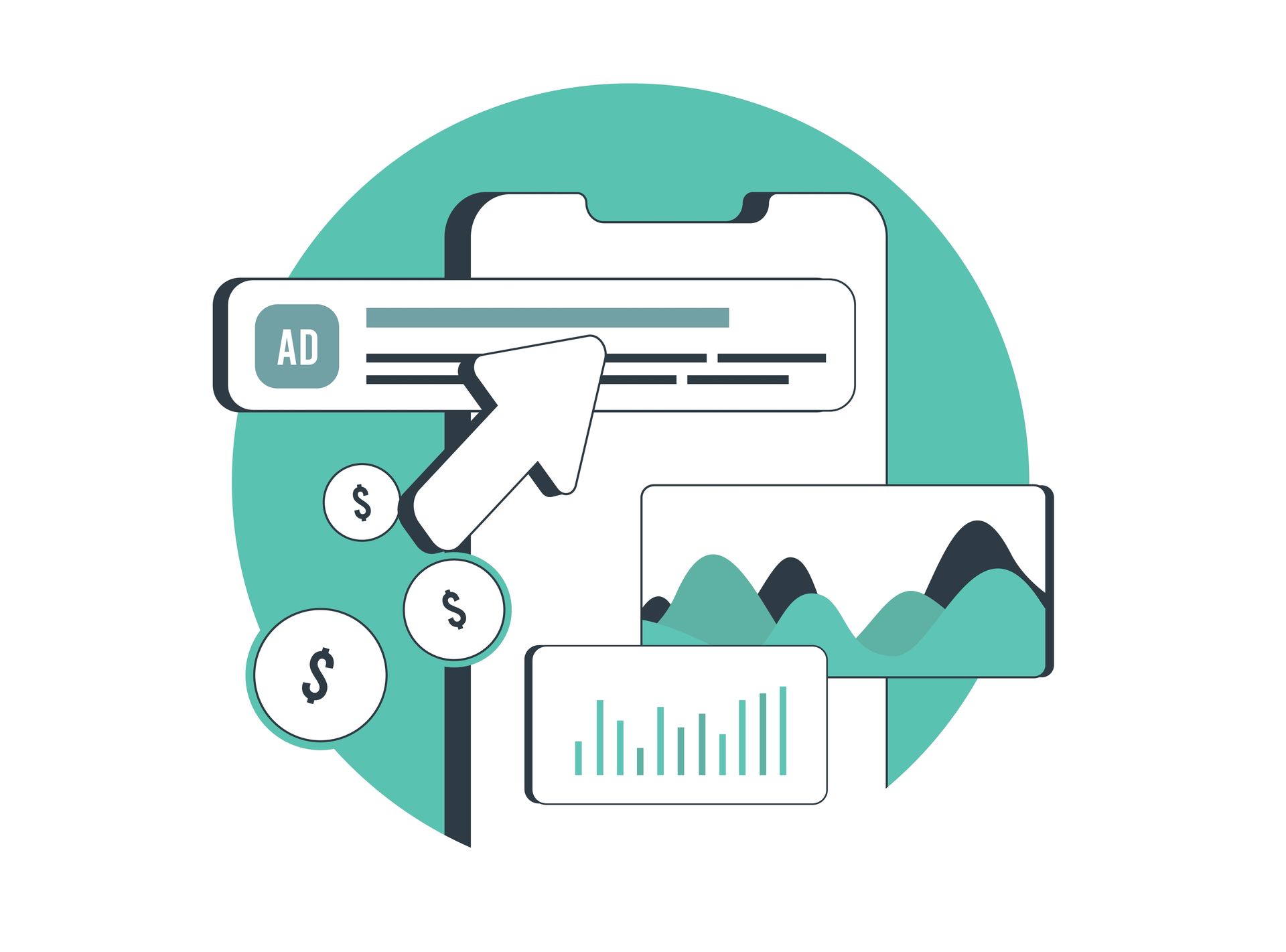Selling on Amazon vs Your Own Site

Choosing a platform to display your products to the online masses is a big decision for ecommerce store owners. Should you sell on Amazon like everyone else? Should you build a custom site and tackle ongoing marketing and promotion? What about Etsy? The options are numerous, and choosing the best option for your particular business can be daunting.
We hope to help answer this question throughout the course of this article. In the following content, we’ll dig into the pros and cons of using amazon vs your own website, talk about Etsy, and provide a brief recommendation from our in-house ecommerce web developers.
Should I Sell on Amazon or My Own Website?
Getting started
Amazon
Setting up to sell on Amazon is very simple. To become an Amazon seller, you simply sign up, list your products, and – boom! – you’re ready to sell.
Your own site
Getting started on a custom website is not as easy unless you hire an agency to assist in the ecommerce design and development process. On your own, you’re going to have to purchase web hosting, create your site, and install a plugin to process payments. The process is doable for someone with a lot of time and drive to learn.
Traffic
Amazon
Amazon receives billions of monthly visitors. Immediate and automatic traffic is one of the most attractive benefits of selling on Amazon. Additionally, Amazon traffic is transaction-minded, looking to buy. According to NPR, nearly 50% of people buy something from Amazon at least once a month.
However, traffic does not always equate to increased sales. Selling on an extremely popular online marketplace is a double-edged sword – you are competing with many other sellers, including Amazon itself, which can lead to pricing wars. Of course, the level of competition will depend largely on your product and industry.

To help gain a competitive edge on Amazon, you can boost traffic to your listings with Amazon ads, Amazon SEO, and external links to your listings.
Your own site
On the other hand, your customized ecommerce website will NOT receive billions of monthly visitors immediately! However, dedicated digital marketing efforts will grow your website traffic over time. These efforts include paid advertising on search engines like Google, SEO, social media marketing, and backlink prospecting.
Although the number of website visitors received on your custom ecommerce site will likely never match Amazon’s, the percentage of targeted traffic interested in purchasing your product will likely become higher.
Additionally, the traffic coming to your website is YOURS (rather than Amazon’s), and your customers will grow to know your brand as a unique entity. You’ll own your customers, and you’ll receive referrals from customers who can reference your business, not just as “Amazon.”
Customization
Amazon
On Amazon, sellers do not need to set up a storefront. Private label brands must complete a few steps while signing up for an Amazon store, but ordinary sellers do not. Unfortunately, the benefit of simplicity sacrifices customization possibilities, making it difficult to set your store apart from the rest. Most buyers will simply view your products as “Amazon products.”
Your own site
When you sell from your own website, you can completely customize your store. Ecommerce platforms – such as Shopify or BigCommerce – have themes to choose from. Professional web developers can modify themes entirely, creating a truly customized website.
Cost
Amazon
Amazon is convenient, but it isn’t free. There are a few fees sellers should know about before diving in. First, you’ll have to pay a referral fee for every product sold. Fulfillment by Amazon (FBA) sellers must pay an additional FBA fee. In return, Amazon takes care of order fulfillment. Finally, every Amazon seller pays a $39.99 monthly membership fee.
Your Own Site
Of course, a custom ecommerce website isn’t free either. You’ll pay for website hosting. Additionally, ecommerce platforms, like Shopify, have paid and free themes to choose from, as well as a monthly membership fee. This fee can be minimal, depending on the plan you choose. We dove a little deeper into the cost of Shopify recently if you’re interested in learning more about this platform.
Finally, you may choose to hire an ecommerce developer to design the selling platform of your dreams. The costs associated with a developer will depend on the agency of choice.
Ownership
Amazon
Your presence on Amazon is rented. This means you must conform and adhere to Amazon’s predetermined standards, fees, and practices. For some ecommerce businesses, this is perfectly adequate! For others, ownership is crucial.
Your own site
You will have complete ownership of your own site. This means you can edit your product page design, checkout process, third-party applications, etc. throughout the lifetime of your business.
Data
Amazon
Data is a valuable tool for any seller. Amazon provides general analytics, including total sales by month, sales by product category, costs analysis, etc.
Your Own Site
Google Analytics is a powerful tool that can be easily added to custom sites. GA provides in-depth, detailed reports on nearly every area of your website, from orders and sales to traffic demographics.

What About Etsy?
Like Amazon, Etsy is a marketplace, meaning that businesses sell alongside other businesses in rented space. There are additional pros and cons to consider!
- Etsy (like Amazon) is easy to set up.
- Etsy has limited customization capabilities.
- Your website domain is owned by Etsy. Like Amazon, it can be difficult for customers to remember your business name, rather than just the name of the marketplace.
- Etsy has some fees (not surprisingly!): listing fees, credit card charges, transaction fees, etc.
- Etsy is extremely popular, receiving millions of monthly visitors.
- Etsy has a free plan option and a $10 per month plan.
Can I Use a Mix of Platforms?

Can’t decide on the best platform for your ecommerce store? That’s okay! You don’t have to pick just one. In fact, you can establish a strong presence on Amazon, Etsy, and a custom website at the same time, diversifying your visibility. These platforms even build upon each other. For example, Shopify’s App Store allows for integration with both Etsy and Amazon.
RivalMind: Strategic Ecommerce Management
At RivalMind, we are Shopify development partners. Based on our extensive experience, we always recommend Shopify for businesses looking for complete website ownership, ongoing success on search engines like Google, and actionable data.
To learn more about our Shopify expertise or inquire about a website, feel free to reach out at (331) 228-9636 or complete our online contact form. A member of our team will promptly respond. We look forward to beginning a conversation!

Meet the Author
Harley Helmer
Director of Search Marketing
Harley Helmer is a digital marketing professional with nearly a decade of experience in the industry. Today, he's the head of search marketing strategy at RivalMind, responsible for developing and executing comprehensive SEO campaigns that improve online visibility and boost organic traffic. His pragmatic, no-nonsense approach to marketing – paired with a robust knowledge base – helps him deliver innovative solutions to technical challenges and deliver real client success.
Specialties: SEO Strategy, Google Ads, and Search Marketing Opinions
Looking for more organic website traffic?
Welcome to RivalMind. Our purpose is to help your business thrive. We are a digital marketing agency that offers SEO, PPC, Web Design, Social Media and Video Solutions as tools to our clients for online business development and growth.
Contact us today to get started!
Blog Contact Form
Connect with Us:




